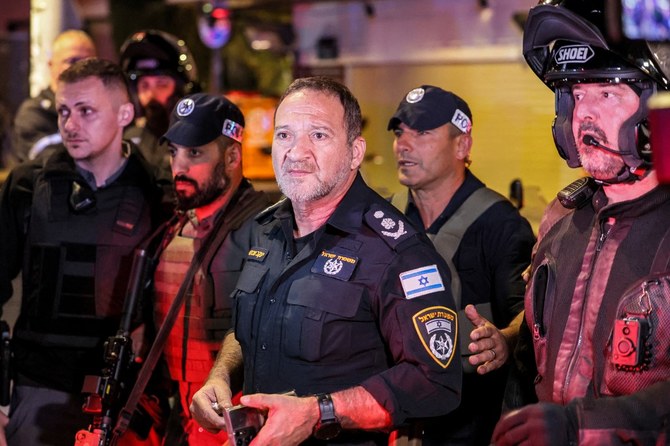LONDON: A leaked recording in which Israel’s police chief described Arabs as murderous by “nature” has sparked outrage among Israeli Arab parties.
During a private phone conversation last week, Israel’s far-right national security minister Itamar Ben-Gvir and Police Commissioner Kobi Shabtai discussed plans to establish a national guard, in part to combat allegedly high crime rates in Arab communities, the Times of Israel reported.
“One murder after another. It has crossed every line. We need a strong national guard,” the security minister was quoted to have said in the conversation’s transcript, leaked to Israel’s Channel 12 on Tuesday.
The police chief’s recorded response was: “Mister minister, there is nothing that can be done. They kill each other. That is their nature. That is the mentality of the Arabs.”
The two officials have been arguing for over a week after Israel’s government approved the formation of a national guard. Opponents, including the police chief and opposition leaders, said this force should not be controlled by the far-right minister, who heads the Jewish Power party, for fear of it functioning as a “private militia.”
Denouncing Shabtai’s comments, leader of the United Arab List Mansour Abbas said: “We expect the police commissioner to retract the obscene things he said about Arab society and apologize to the Arab public or resign from his position.”
He called on PM Benjamin Netanyahu and President Isaac Herzog “to fully condemn Shabtai’s racist statements.”
Knesset member and leader of the Joint List party Ayman Odeh demanded that Shabtai be dismissed from his role over the comments, claiming they were factually inaccurate.
“The number of Palestinians killed in (criminal incidents in) Israel is seven times higher than the number of Palestinians killed (in criminal incidents) in the West Bank, Gaza and Jordan,” Odeh tweeted.
“This is not the nature of the Palestinians, it is the nature of the racist establishment,” he added. “In any other country, a racist commissioner like Shabtai would be fired in an instant.”
Waleed Alhwashla of the United Arab List said, according to Haaretz, that Shabtai had descended “into the abyss of racism and prejudice” with his comments.
The Israel Police issued a statement expressing its shock that the minister’s office recorded a personal phone conversation between Ben-Gvir and the police commissioner, saying it was “outraged that things were taken out of context.”
The statement also said the conversation in question “dealt with the patterns of behavior in Arab society, which does not reveal the identity of the murderers even when it is known to the relatives of the victims.”
But the statement made no attempt to apologize for Shabtai’s comments.
Ben-Gvir, who has been Israel’s minister of national security since November, was convicted in 2008 of inciting racism against Arabs and supporting a terrorist organization.
He had also been charged over 50 times with incitement to violence or hate speech.
Last August, he called for the introduction of a bill giving courts the option to expel Arab citizens who attack Israeli soldiers while, at the same time, saying “Jews” guilty of the same act should “sit in prison for many years” instead of deportation.
The police chief’s controversial comments against Arabs come amid rising police violence against Palestinian Muslims during the holy month of Ramadan and ahead of the Jewish Passover festival.
Israeli police stormed the Al-Aqsa Mosque in Jerusalem’s Old City in the early hours of Wednesday, firing stun grenades and rubber bullets at Palestinians. Videos on social media also showed Israeli police beating Palestinian worshippers inside the mosque with batons.
This has prompted Palestinian factions to fire missiles from the Gaza Strip at the Israeli town of Sderot, but most were intercepted by the Israeli Iron Dome defense system. Israel responded by bombing the coastal strip.


























